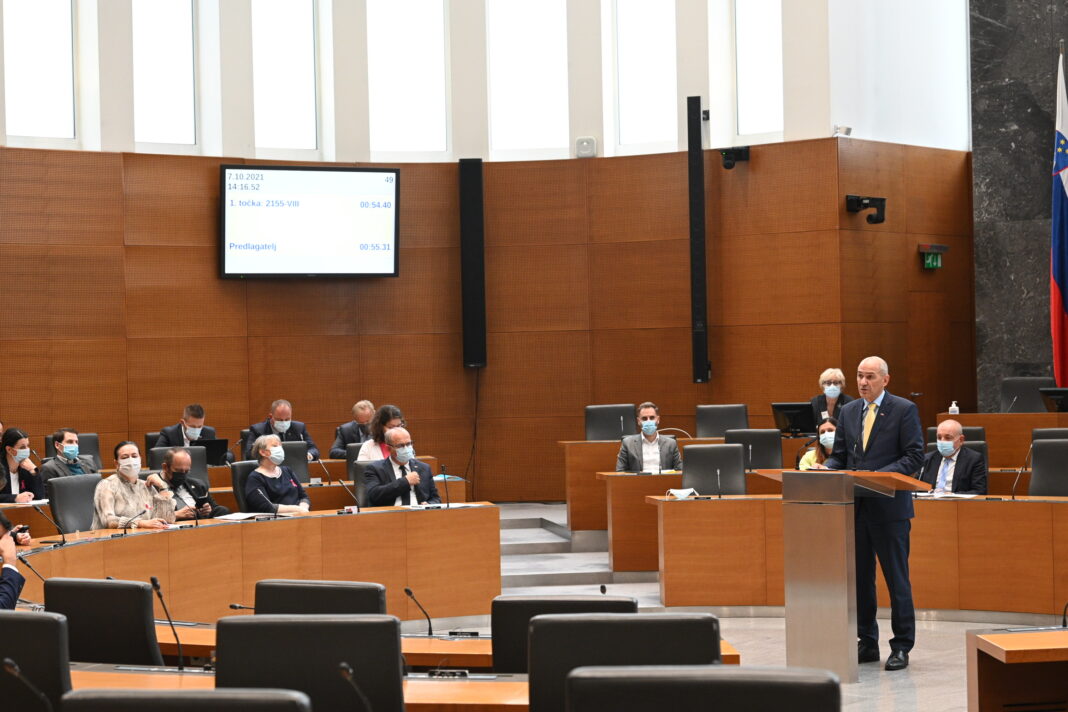By: UKOM
At the 29th regular session of the National Assembly, Prime Minister Janez Janša answered parliamentary questions put to him by Branko Simonovič (Desus) on the adoption of implementing regulations based on the Long-Term Care Act, Zmago Jelinčič Plemeniti (SNS) on the current situation in the Republic of Slovenia, Janja Sluga (non-affiliated deputies) on the amendment to the Communicable Diseases Act, and Mojca Žnidarič (Konkretno) on Slovenia’s international rankings.
In his reply to the parliamentary question on the adoption of implementing regulations based on the Long-Term Care Act, Janez Janša first thanked the deputies for their support of this Act, which has been a long time in the making. He said that the implementing regulations had been drafted parallel to the Act. “All nine rules related to the Long-Term Care Act are being drafted now and, according to the assurance given by the two responsible ministries, the first rules will be submitted for public discussion this week.” He expressed his hope for the widest possible participation of the lay and expert publics alike and said that the rules would be adopted within the timeframe prescribed in the Act.
When asked about the current situation in the Republic of Slovenia, the Prime Minister replied that a general assessment based on feelings and preferences was one thing, while the assessment based on objective figures and indicators from the European Statistical Office (Eurostat), the European Commission, the competent offices of the European Union, and the Organisation for Economic Cooperation and Development OECD), was quite another. On the basis of these objective data, we can get a realistic picture by means of comparison. According to the ranking of the performance of individual countries in tackling the pandemic, published in the British magazine The Economist and based on OECD data, Slovenia ranks second, just behind Denmark. These data indicate that Slovenia has not only maintained its potentials during the pandemic but has in fact even increased them. “What is most important for the citizens of this country is definitely the fact that the disposable income of households in Slovenia has increased by 10%.” In response to the additional question about the sale of Slovenian hotels to a Hungarian buyer, the Prime Minister was clear that this government had nothing to do with this sale and that other governments, now pointing the finger at this government, had been selling these shares to foreigners. He described the fact that some people were actually striving to have the funds that Slovenia had negotiated for the next seven-year period frozen or taken from Slovenia as a deplorable act. In this context, he recalled the letter sent to Brussels by State Prosecutor General Šketa and the setting of conditions by Commissioner Lenarčič in Brussels. “It is unbelievable that someone who is sent by their country to the European Commission and receives a salary of EUR 20,000 every month is jeopardising the funds for urgent investments in our country.”
When asked about the amendment to the Communicable Diseases Act and the ordinances, Prime Minister Janša responded that, at the time of drafting the legal basis for tackling the epidemic, no other Member State of the European Union had adopted ten anti-coronavirus packages. “Each of these acts has upgraded the legal basis.” With regard to the ordinances, the Prime Minister said that all other governments of EU Member States had acted primarily through ordinances. “In Italy, ordinances were adopted by the Prime Minister, in France by the President, i.e. by one single person. They also declared states of emergency. None of that has happened in Slovenia.” Regarding the law being drafted by civil society, the Slovenian Prime Minister said that this contravened the Constitution, the principle of separation of powers and the recommendations of the World Health Organisation and that it was completely non-operative. “Read this law and put yourself in the position of the National Institute of Public Health, the Ministry of Health and the government and imagine how this would work in practice.”
In his response to the parliamentary question on Slovenia’s international rankings, Prime Minister Janša said that it was normal to a certain extent that the opposition and the coalition assessed the situation differently. However, when it comes to certain fundamental postulates, we should nevertheless speak the same language. He also expressed his disappointment that the good results in Slovenia, its high GDP growth and the historic employment rate made some people sad. “You do not compete by opposing something; you compete by trying to be better. Slovenia has borrowed less than the OECD countries on average and a quarter less than the countries from the Euro area. For the last two years, Slovenia has shored up or improved its position with the international credit rating agencies.” The Prime Minister added that Slovenia’s ranking on the scale used by the British magazine The Economist was not the only thing we were happy about: Slovenia is, for example, also the ninth most sustainable country in the world. “In one single year, we have jumped several places up on the EU Digital Index scale, which is extremely important at a time when digital transition is one of the key strategies.” The Slovenian Prime Minister concluded his answers to the parliamentary questions from the deputies by saying that, in the end it is always the question of what is in it for the people and reiterated, “Even in this time of the epidemic, the disposable income of Slovenian households has increased by 10%. It is not that the banks’ balance sheets have improved, although this has also been the case, but that the money has gone mainly to the people. People are spending money to provide a better living standard for themselves, but at the same time they are also financing the budget, robust enough to meet our common needs.”
Source: gov.si

